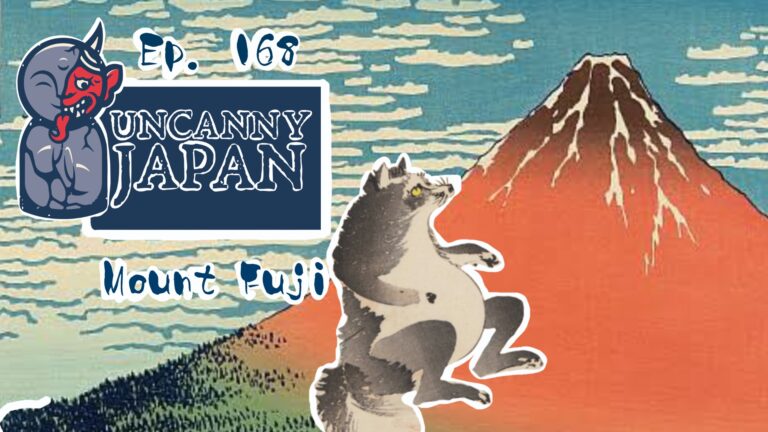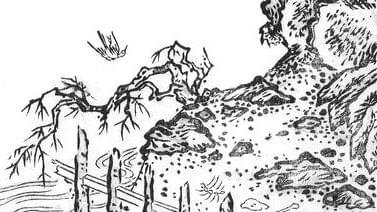Today’s show feels like a wacky and wonderful one. You see, I started talking about the tengu in Episode 32 (Heavenly Dogs and Brilliant Swordsmen), but I wasn’t able to cover one of my favorite things about this red faced, long nosed, mountain warrior. That being the notion of kamikakushi (神隠し) or being spirited away. In this episode I get into that but the more I researched the really wild and fascinating information I ran across.
In this Episode 34: Spirited Away (Kamikakushi), I’ll tell you about the Shinto scholar Atsutane Hirata who back in the 1800s interviewed and wrote a book about a boy (Torakichi) who had claimed to have been abducted by a tengu for many years. There are stories of 100-days fasts, trees that glow from an inner light, and small unlucky men riding horses who are born from the placenta of a new born baby.
All this while I walk through a drizzly evening, recording the first frogs of the season.

Hey hey everyone. This is Terrie on a drizzly, froggy spring evening. It seems like literally overnight all those hibernating frogs popped awake and began to sing. Two nights ago it was quiet, tonight, voila. You guys are in for some frog-laden podcasts, I tell ya, and I’m hoping this year to finally catch the elusive, send-chills-down-your-spine ushigaeru, a kind of Japanese bull frog. So there’s something to look forward to.
What is Kamukakushi?
Now, onto today’s topic. If you’ll remember two Uncannys ago, in Episode 32: Heavenly Dogs and Brilliant Swordsmen, I did an introduction to the tengu–a long-nosed, red-faced mountain warrior. Today, I want to dig a little deeper and talk to you about that neat little bit of tengu lore that I hinted at last time. Something called kamikakushi (神隠し).
The two characters mean “hidden by God” or “hidden by the gods.” I’ve always liked that translation and I didn’t realize it could be any better until I saw the English title for Ghibli’s movie, “Sen to Chihiro no Kamikakushi.” In English it’s simply called “Spirited Away,” and that translation is probably much closer to what the phenomenon really is.
Tengu-sarai
Kamikakushi doesn’t involve a god or gods, but is indeed a tengu doing the spiriting away. Sometimes instead of kamikakushi it’s called tengu kakushi (天狗隠し), “hidden by a tengu” or tengu sarai (天狗攫い), meaning something like “being swept or stolen away by a tengu.” And that’s just what it is. This kamikakushi, or being spirited away, is how people used to explain the sudden and mysterious disappearance of children and sometime even adults. One day a child vanishes and after a thorough search with no luck, the whole incident is chalked up to a kamikakushi.
Now, if this idea of tengu sarai ended there, it would be an interesting, albeit sad old wives tale. I don’t know, maybe a child wanders off and gets lost in the woods or falls into a river and gets carried away by the current. It makes sense though, for a distraught parent, instead of imagining the worst–a wild animal or drowning–to deal with the loss in this curious and farfetched way. The idea of a tengu swooping in and snatching up the child is offered up as a way of explanation. Birgit Staemmler sums it up best in the Japanese Journal of Religious Studies in her article, “Kamikakushi, Folk Belief and Media” when she says, “Thus, kamikakushi was often the somewhat consoling belief that a missing family member had not met with a dreadful accident, but been taken on a long and interesting journey and might even returned someday. Defining a missing person as having met with a kamikakushi had the additional significant psychological effect of ending the period of anxious searching, allowing relatives to deal with their loss and to name and blame the culprit.”
Now she hints at it, but let me tell you what makes this belief in kamikakushi or tengu sarai really fascinating to me. And that is that sometimes the missing child came back–days, weeks, months or even years later, often showing up in some strange place like the top of an altar or in the eaves or even the roof of a temple. He’s dazed, sometimes falling into unconsciousness for days or weeks or even years. When he wakes again, he has either lost his mind or relates memories of flying through the air, jumping from treetop to treetop or seeing amazing distant places.
Kunio Yanagita
You might have heard of Kunio Yanagita. He is the author of Legends of Tono and is the founder of Japanese folklore studies. Yanagita made a list of observations common to most kamikakushi. First, he said that more often than not, boys and young men were the ones to be taken and they were labeled kamikakushi only when they were not found and did not reappear after several days. Tengu were probably suspected to be the culprits because they are mountain dwellers and have the ability to fly, which made sense when you note that most of these tengu sarai occurrences happened in out-of-the-way places, usually around mountains or rivers. Also, Yanagita said that the majority of kamikakushi happened during the winter and harvest seasons. And finally, if the abductee was fortunate enough to be returned home, he sometimes had some mental disability, had gone crazy or told stories of wondrous journeys to far away places and flying through the air.
Hirata Atsutane and Torakichi
There have been stories of kamikakushi in Japan for many centuries, but the one I want to talk a little about today is probably the most well-known and definitely the most well-documented instance of tengu sarai. A Shinto scholar, Hirata Atsutane (平田 篤胤), met a teenage boy named Torakichi (寅吉) who claimed when he was seven years old he’d been kidnapped by a high ranking tengu and spent years in the otherworld learning from and training with him. Hirata became obsessed with the boy’s tale. He interviewed him, eventually going so far as to have the teen live with him for eight years so he could document his entire story.
Hirata ended up publishing all his findings. Basically, everything you want to know about being kidnapped by a tengu in a book called Senkyo Ibun (仙境異聞). This was back in 1822. Let me tell you just some of the fantastical tales found in the book.
The Story of Torakichi
It started when Torakichi was seven and witnessed an old man with long white hair, a beard, strangely glittering eyes, who was holding a bowl and selling pills near the gate of a shrine. Torakichi continued to watch the curious old man until he eventually saw him step into the bowl, one foot at a time. The bowl then floated up and carried the old man away. This odd occurrence continued daily until the curious old man, realizing he’d been seen by the boy, invited Torikichi to also step into the bowl. Torikichi hesitated, but the glittering-eyed old man explained that he could show him lots of interesting places. While taken away, Torakichi was told never to reveal the name of his abductor/master. He was told if he was ever asked, to say his name was Sugiyama Sojo and he was one of the 13 tengu living on Mount Iwama.
The boy’s training began by having him fast for 100 days to prove he was worthy. At the start of the fast, to further pledge that he would do his best, the tengu pulled off one of the boy’s pinky fingernails. It was extremely painful, of course. Now it was time to start the fast of 100 days. The first time, however, Torakichi failed the test because he was so hungry and remembered a rice ball someone had given him earlier and gobbled it up. This caused the tengu to become so outraged that he punished him by throwing him down the mountain seven times.
The second time Torakichi attempted the 100 day fast, he passed the test. It might have been because the tengu tied him securely to a tree this time. Still, he recounts it was extremely difficult and he was so deranged with hunger, he couldn’t tell night from day. But he managed to complete the test, and later when he examined his pinky finger, the nail had come back. The boy was so exhausted after the fast he couldn’t stand up, hold anything in his hands, speak, or even hear. He fell into a deep sleep, during which he had a dream about someone coming up and putting food into his mouth. He slept for a long time, but when he woke up he said he felt as if he was beginning a new life with a new mind.
Hirata, when writing about the boy in his own personal journals, noted in 1821 that Torakichi amazed people with his great skill at sword, spear, bow and gun. This he thought was just further proof that the boy had been kidnapped and trained by a tengu.
Torakichi spoke of the martial arts training. He said that he began his swordsmanship lessons by taking a mouth-full of beans, spitting them out one at a time, and then slicing them in half with his sword before they hit the ground. After he could do this with a thousand beans, then he had to do it again this time spitting two beans out and slicing through both. Next, he graduated to two swords but cutting in half three beans and then four. It was only after that that he could have real sword contests with others. Real blades, but with helmet and armor.
“What about magic?” he was asked. Tengu are said to be able to do magic. Torakichi said that some old Japanese poems are actually magic spells. For example, once in the otherworld he had someone tie his hands together tightly and then he recited an old poem from the Hyakunin Isshu. It goes like this:
「ほのぼのとまこと明石の神ならば、今こそゆるせ人丸の歌」
And miraculously, the ropes untied themselves from his hands. I’m in no way saying that this will work, mind you, this is what Torakichi said.
Oh, and also here’s a recipe he gave for a man whose friend had syphilis and a bad cough. Chop up some green pine needles and roast them until they’re black. Then cook them with mustard seed and bean curd. He insisted that this delicacy is very good for coughs. Again, don’t do that.
Sugiyama Sojo, Torakichi’s Tengu Master
Here’s another interesting tidbit he related to those interested in his adventure. Are you bothered by long nose hairs? Well, you should never pull them out. Torakichi’s tengu master, Sugiyama Sojo, said long nose hairs were a sign of longevity. The tengu’s own nose hairs were so long in fact, they got tangled up in his beard and he took great care of them.
Another thing Torakichi recalled was that his tengu master loved to give long lectures on astronomy and military science. They started at 10 in the morning and went on until midnight. As you can imagine, not everyone believed these wild tales. Hirata was a very well-known and respected scholar, but obviously some of his students and associates felt he was being duped by the boy’s far-fetched claims, so they disassociated themselves with him. Some believed that maybe Hirata was the one in fact padding the interviews with his own wild ideas.
Still, there were many more people who were enthralled with the stories and wanted to hear more. Torakichi did talks and was quite good at speaking. He’d hook his audience by beginning his speech telling the crowd that he promised the tengu he would never tell this secret, and then the teen would go into detail about some strange remembrance from his time with Sugiyama Sojo, the tengu. He ‘d tell about things he’d seen in this other world: trees that glowed from an inner light and were used as nightlights; an armored creature the size of a horse that had long needles all over its body that threw off sparks; and also the strange mini warrior on a mini horse with a mini sword. It was very evil and could bewitch a man his entire life. It was called a mametsuma, and appeared when babies were born. It was made from the placenta of the mother who had just given birth. To ward a mametsuma off, you must throw rice at it.
There are so many more tales written in the Senkyo Ibun, but the adventure ended in the spring of 1820 when Torakichi was set down at the gate of the Kanon temple in Asakusa. He was returned home. Later, when he was physically examined by Hirata for the first time, the scholar said he appeared in all ways like a normal boy, except for a pair of strangely glittering eyes. Like I said, there is so much more in Hirata’s book, Senkyo Ibun. If you don’t read Japanese, but would like to dip into some of what’s written there, a lot of the Torakichi stories I found in the scholar Carmen Blacker’s collected works volume one. If you can find that, it’s well worth the read.
I want to end with another very curious belief about kamikakushi, and that is in the interviews with Torakichi, he claimed to have visited all sorts of wondrous places. One of them was the moon. He also mentioned seeing waves on the sun. It is that last thing that has some people believing that the tengu who kidnapped the boy was in fact an alien, a gray, and the whole thing was some weird trip in a spacecraft. The waves on the sun were solar flares. There is even a Japanese manga that is running with this theory and has a tengu warrior character who is in fact an extra-terrestrial.
So that’s all for today. Thank you all for listening and a super special thank you to my patrons, because of your support I was able to cut down on some hours from April, so I’m no longer working six days a week. Yay. Freeing up the time not only feels great, but I’m going to reinvest that energy back into my writing, the podcast, and of course, Patreon. Thank you again and I’ll talk to you soon.
Pssst! Hey, do you like scary stories? Or maybe you don’t do full-on horror, but enjoy a nice dark tale. Something creepy involving Japanese folklore and superstition. Well, if that’s the case, you can sneak on over to Amazon or wherever you like to buy books and look for my two short story collections: A Robe of Feathers and The Carp-Faced Boy. All you need to do is search for Theresa Matsuura. Let me spell that for you. T-H-E-R-S-A, M-A-T-S-U-U-R-A. Another place you can find me doing things is on Patreon. There, once a month for my five dollar and up patrons, I translate, retell and record obscure Japanese folktales. Some are dark, some are humorous, some are just weird. And lastly, another super sweet thing you can do is to write a review on iTunes. By doing this you help like minded people find Uncanny Japan. It’s a little thing but it means a lot and it’s a great big help. Thank you, I’m Thersa Matsuura, and I’ll talk to you soon.
Credits
Intro and outro music by Julyan Ray Matsuura







Finally found someone talking about the actual folklore haha.
Recently I’ve been reading a series of books called missing 411 and became really interested in the subject. Most of the books document mysterious disappearances in national parks of the US, usually in mountain trails close to rivers or lakes. Some people were never found, but others came back alive. Some of them without any recollection of what happened to them (pretty similar to kamikakushi right?).
Anyway this is a really interesting page, I’ll be sure to follow your podcasts. Keep up the good work.
Thank you for listening, Rodrigo! Yes, it’s really interesting how these phenomena cross cultural boundaries. That sounds very similar to the kamikakushi.
This reminds me of old European tales of children being kidnapped by faeries.
It’s such a dark and sad subject, but part of me is fascinated about how missing children throughout history have had these tales told about them.
I wonder if someone did a bunch of research and wrote a book about it. I’d read that.